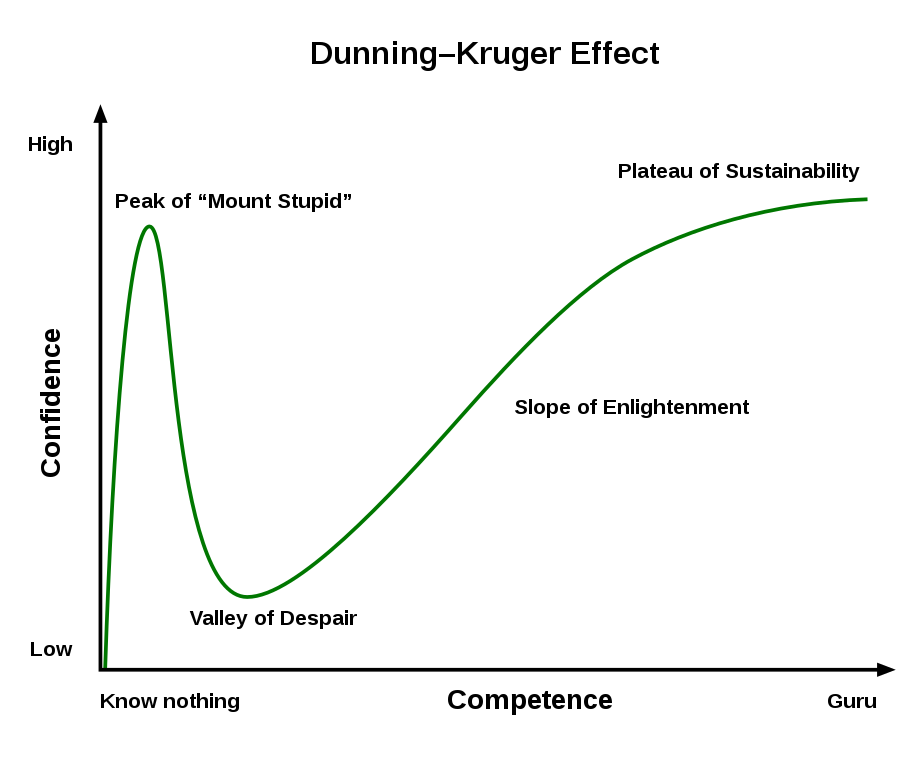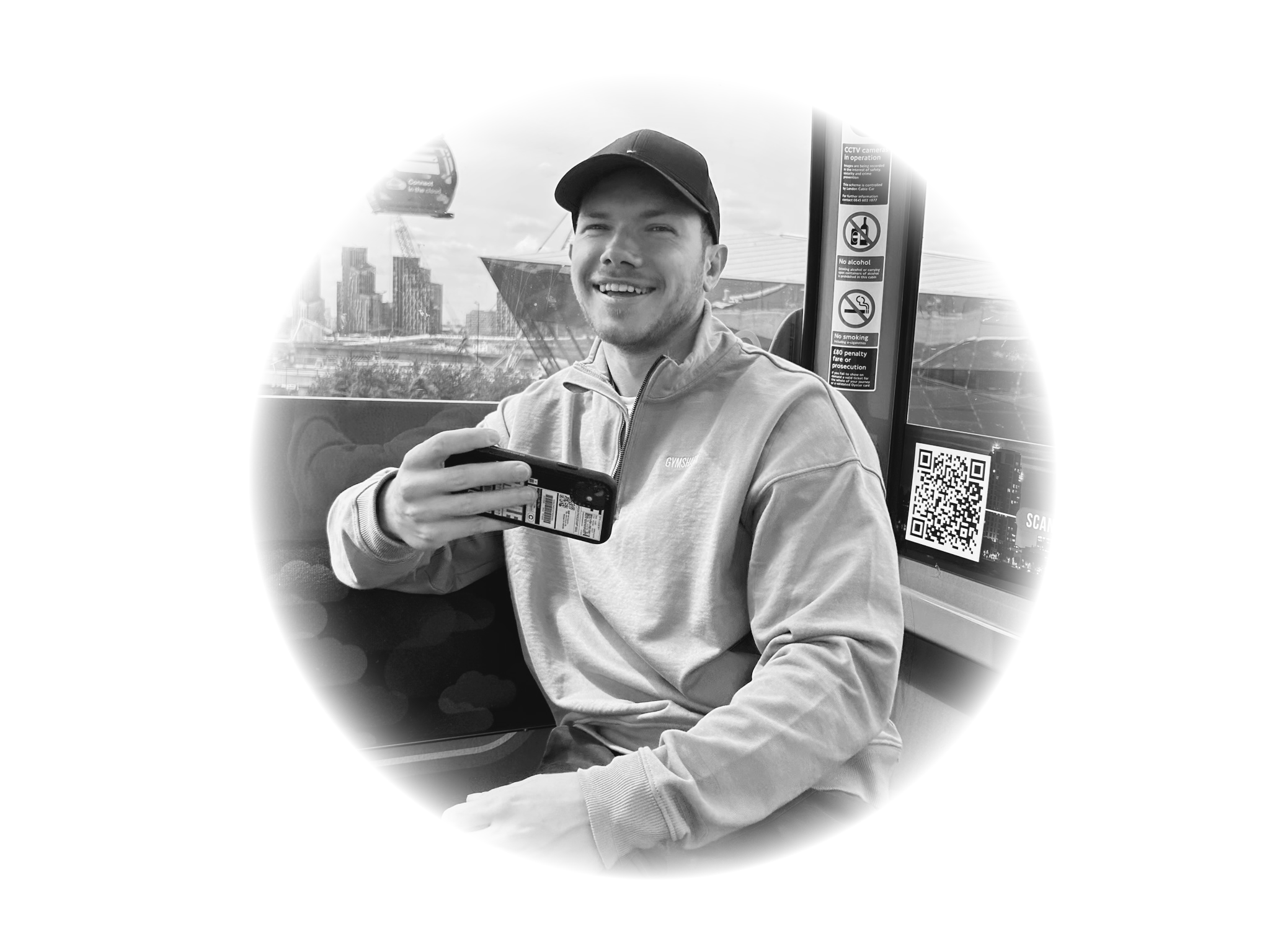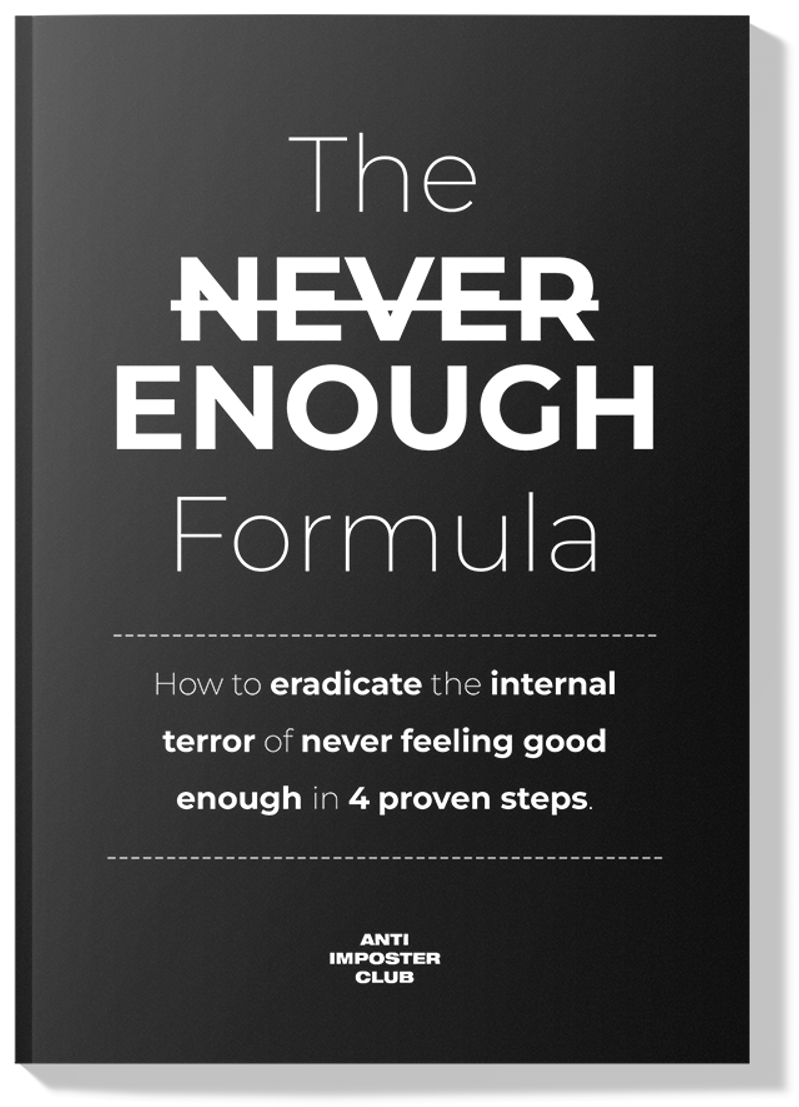How good do you think you are?
At your job, at driving, at making conversation, and all those other skills that make up your life?
Feeling confident? Or not so much...?
The things that we are good at matter a lot.
People who have read my article describing the basics of becoming successful will know by now that one of the key ingredients to achieving your goals is to become a true master at what you do.
And to accomplish that it pays to have an accurate answer to the above question and know what we are good at what we need to improve on so we can work on those weaknesses and accelerate our path to success.
However, turns out that answering the above question can be a pretty demoralizing thing to do since most of the time we are probably not as good as we think we are.
How so?
The two social psychologists David Dunning and Justin Kruger found a rather interesting peculiarity of our minds: the Dunning-Kruger Effect.
I am sure you would agree with the fact that our confidence in our own abilities changes as we gain competence in a certain discipline.
However, have you ever thought about how our confidence changes over time?
Probably not because it seems quite obvious, doesn't it.
You would think that as you become more skilled in a certain field of expertise, you also get more confident in your skills. Makes sense, right?
Well, actually the truth looks a little different.
According to Dunning and Kruger, our confidence curve looks more like this:

What Dunning and Kruger found in their research is that our judgment of how good we think we are at what we do tends to be completely out of touch with how good we actually are.
More specifically they found that:
💡 Incompetent people tend to grossly overestimate their abilities.
Or in other words, the world is full of confident idiots.
A classic example of these people can be found in the great wealth of YouTube videos like this one that humorously embarrasses all those men who clearly overestimate their driving skills and crash their cars while trying to show off.
Personally, I have seen (and been caught out by) the Dunning-Kruger effect a lot in the world of investing and stock trading. During my many visits to trading fairs, seminars, and workshops I have seen too many examples of people who do one online course, read one book or article about a trading strategy, have one lucky trade, and all of a sudden think of themselves as the new Warren Buffet. Loaded with that confidence they then enter highly risky trades that a competent professional trader would never enter and are soon enough painfully humbled when one of their trades goes wrong and wipes out their entire capital.
But how can we be so bad at judging our abilities?
According to Dunning and Kruger, the problem is that the skills and knowledge needed to perform well in a given discipline are also the exact same skills needed to accurately assess how well one is doing in that discipline.
Hence, when these skills are missing in the first place, incompetent people are unable to accurately evaluate their abilities. Specifically, they are completely oblivious to their deficiencies, the mistakes they are making, their knowledge gaps, and other people's genuine skill and expertise that would give them a clear benchmark of how good they actually are.
In essence, incompetent people are therefore facing a **"dual burden": ****Not only are they lacking the skills to do well in a certain area but are also oblivious to their incompetence.
And as these YouTube videos and Warren Buffet wannabes have shown, sitting on Mount Stupid can be pretty dangerous.
(Personal opinion: To throw my own scientifically-*not-*tested 2 cents in here as to why we tend to overestimate our abilities when we are actually incompetent, I would also add that when we know absolutely nothing about a particular topic and first learn about it, the initial gain in knowledge feels particularly great because it takes us from nothing to something, which is perceived to be more impactful than going from some knowledge to a little more knowledge, thereby making us feel disproportionally more confident about our abilities.)
Interestingly, Dunning and Kruger not only found that incompetent people overestimate their abilities but also that the opposite is the case, i.e., that competent people underestimate their skill levels. Which can be equally problematic.
Competent people face an entirely different issue. In essence, they are smart enough to recognize their deficiencies and knowledge gaps, the mistakes they are making, and other people's genuine skill and expertise, i.e., everything that confident idiots are oblivious to.
The problem with being able to recognize one's deficiencies is that it can strongly hurt one's self-esteem and therefore make us stumble into the valley of despair, in which we start to question ourselves, whether we have got what it takes and whether we should just give up.
The fact that smarter people feel more insecure about themselves than their unskilled counterparts even though they are smarter than them (!) may seem a bit paradoxical at first, however, I am sure we have all been in a situation in which we painfully realized that we have got A LOT to learn, that we are nowhere near as knowledgeable, skilled, or successful as others in our field and felt demotivated and overwhelmed as a result of that epiphany.
This is also how most of the amateur traders must have felt after they realized that they were making catastrophic mistakes like trading with money they cannot afford to lose or giving into their emotions to make impulsive risky decisions that stack the odds of winning against them.
However, don't stress. And most importantly don't give up! There is a solution to overcoming your rollercoaster of emotions.
Let's now have a look at 4 strategies for how we can flatten the Dunning-Kruger effect and not let it hinder us on our path to becoming a true master at our chosen discipline.
The most important strategy in that context is to always keep learning.
If you are just starting out to get stuck into an area that you would like to become a true master in and discover that you might have a talent for something, don't get stuck on Mount Stupid.
Recognize that your little understanding of a topic prevents you from being able to accurately assess how well you are really doing.
Stay humble and focus on continuing to build your competence. By doing so, you ensure that your confidence doesn't fly too high so that once you develop a better understanding of your deficiencies, mistakes, and the genuine skill of others it doesn't come crashing down too hard into the valley of despair.
However, equally, when you do encounter the first setbacks (which you will), don't get discouraged. Accept that to master a discipline, setbacks and failures are inevitable and should be regarded as incredibly valuable opportunities to learn and progress (Learn more about that HERE).
See recognizing your weaknesses as a good thing! First of all, it means that you are smarter than all those people sitting on Mount Stupid and secondly knowing your weak points gives you clarity. It gives you a clear focus regarding what you should work on the most to accelerate your progress on your journey to success. All you need to do then is follow the steps for how to maximize your learning to rectify your deficiencies as effectively as possible.
In combination with constantly building your competence in your chosen field, your second strategy for flattening the impact of the Dunning-Kruger effect should be to expand your metacognition, i.e., to build an understanding of your own thought process.
By learning how your mind works, how your thinking cycle affects your emotions, behaviors, and outcomes, and how heuristics and bias affect your perception of yourself, your wins and losses, and your surroundings, you are able to develop much deeper self-awareness that will help you to maximize your learning, overcome setbacks better and avoid the impact of the dual burden.
Even simply the fact that you are learning about the Dunning-Kruger effect now will help you to mentally prepare by setting better expectations for what the process of mastering a discipline will feel like.
Hence, familiarize yourself with the above concepts, apply strategies that help you exploit them, and adopt practices like journaling/reflection to become in tune with yourself and reap the benefits that come with it.
Strongly connected with developing deep self-awareness to flatten the impact of the Dunning-Kruger effect is the need to "become an accurate thinker" to borrow the words of Napoleon Hill.
Accurate thinking means relying on logic and being very wary of what your emotions think is the best way forward since they are wrong 95% of the time.
As an example, if you find yourself on the hills in the valley of despair you may feel demotivated, not good enough, and start questioning whether you are really meant to master this skill. However, objectively you are smarter than most other people who find themselves on Mount Stupid, which suggests that you are on the right path to achieving your goals!
Accurate thinking will allow you to be realistic about your actual skill level vs your confidence in your abilities. It will prevent you from flying too high when you are prone to overestimate your abilities and help you decide what the most effective course of action is in terms of rectifying your deficiencies and making the fastest progress towards mastering your chosen discipline.
But it will also allow you to recognize your genuine progress and therefore help you build real confidence in your abilities when it is justified.
Hence, be critical and question your emotions vs the facts. Become aware of the narrative fallacy and the existence of silent evidence. Are they limiting you in making accurate assessments of yourself and the situation you are in?
When it comes to accurate thinking also don't be afraid to rely on your past experiences and intuition if appropriate (Use the REF method to decide). They provide clear cause-and-effect relationships that help you better decide on how to think about your skill level and how to address weaknesses.
As we have seen, one of the things that the Dunning-Kruger effect prevents us from recognizing is other people's genuine skill and expertise that would give us a clear benchmark for how good we actually are.
However, we can work against that by proactively seeking feedback about our performances from people who are further up the learning curve than us.
These mentors will have the necessary competence to better assess our current skill level, our deficiencies, the mistakes we are making, and our knowledge gaps. On top of that, they will be able to let us dip into their past experience and give us great advice on how we can rectify our drawbacks or how we can fight back from setbacks and failures.
Seeking out feedback may feel a little uncomfortable since it exposes our vulnerabilities, however, as mentioned above - and I can't stress this enough - our failures and weaknesses provide incredible opportunities for learning and progression. Hence, learn to take criticism, don't let it drag you down but focus on its benefits in accelerating your progression towards your goals.
My Story

My name is Stefan, and just like you, I had (and still have) this little voice in my head telling me that I'm not good enough.... continue reading
More blog posts
What everyone ought to know about boosting your self-esteem.
(Do not carry on with your self-affirmations if you truly want to feel confident again.)

Discover what the real 'currencies of self-esteem' are and how to amass them like weeds.